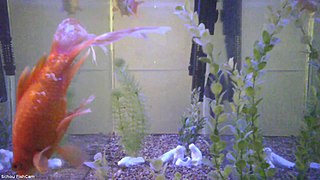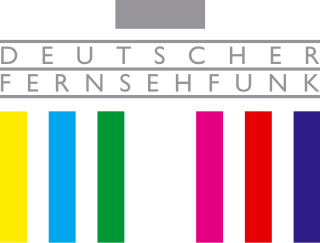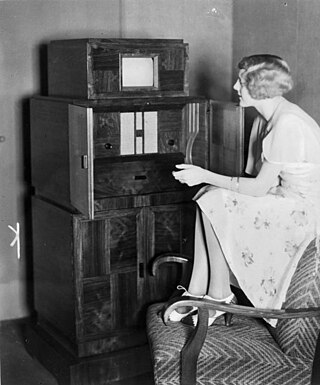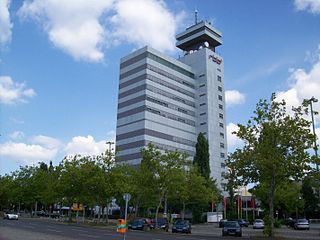
ARD is a joint organisation of Germany's regional public-service broadcasters. It was founded in 1950 in West Germany to represent the common interests of the new, decentralised, post-war broadcasting services – in particular the introduction of a joint television network.
Tagesschau is a German national and international television news service produced by the editorial staff of ARD-aktuell on behalf of the German public-service television network ARD.
Das Erste is the flagship national television channel of the ARD association of public broadcasting corporations in Germany. Das Erste is jointly operated by the nine regional public broadcasting corporations that are members of the ARD.
Westdeutscher Rundfunk Köln is a German public-broadcasting institution based in the Federal State of North Rhine-Westphalia with its main office in Cologne. WDR is a constituent member of the consortium of German public-broadcasting institutions, ARD. As well as contributing to the output of the national television channel Das Erste, WDR produces the regional television service WDR Fernsehen and six regional radio networks.

Aktuelle Kamera was the flagship television newscast of Deutscher Fernsehfunk, the state broadcaster of the German Democratic Republic. On air from 21 December 1952 to 14 December 1990, Aktuelle Kamera was one of the main propaganda tools of the East German government.

Fishcam refers to a broadcast consisting of a video camera pointed at a fish tank.
Television in Germany began in Berlin on 22 March 1935, broadcasting for 90 minutes three times a week. It was home to the first public television station in the world, named Fernsehsender Paul Nipkow.

Norddeutscher Rundfunk is a public radio and television broadcaster, based in Hamburg. In addition to the city-state of Hamburg, NDR broadcasts for the German states of Lower Saxony, Mecklenburg-Vorpommern and Schleswig-Holstein. NDR is a member of the ARD organisation.

Rundfunk Berlin-Brandenburg is an institution under public law for the German states of Berlin and Brandenburg, based in Berlin and Potsdam. RBB was established on 1 May 2003 through the merger of Sender Freies Berlin (SFB) and Ostdeutscher Rundfunk Brandenburg (ORB), based in Potsdam, and is a member of the Association of PSBs in the Federal Republic of Germany (ARD).

Sender Freies Berlin was the ARD public radio and television service for West Berlin from 1 June 1954 until 1990 and for Berlin as a whole from German reunification until 30 April 2003. On 1 May 2003 it merged with Ostdeutscher Rundfunk Brandenburg to form Rundfunk Berlin-Brandenburg.

Ostdeutscher Rundfunk Brandenburg, based in Potsdam, was the public broadcaster for the German federal state of Brandenburg from 12 October 1991 until 30 April 2003. It was a member organization of the consortium of public-law broadcasting organizations in Germany, ARD.

NDR Fernsehen is a German free-to-air regional television channel targeting northern Germany, specifically the states of Schleswig-Holstein, Lower Saxony, Mecklenburg-Vorpommern, Hamburg and Bremen.

Deutscher Fernsehfunk was the state television broadcaster in the German Democratic Republic from 1952 to 1991.

The first regular electronic television service in Germany began in Berlin on March 22, 1935, as Deutscher Fernseh Rundfunk. Broadcasting from the Fernsehsender Paul Nipkow, it used a 180-line system, and was on air for 90 minutes, three times a week. Very few receivers were ever privately owned, and viewers went instead to Fernsehstuben. During the 1936 Summer Olympics, broadcasts, up to eight hours a day, took place in Berlin and Hamburg. The Nazis intended to use television as a medium for their propaganda once the number of television sets was increased, but television was able initially to reach only a small number of viewers, in contrast to radio. Despite many technical improvements to camera technology, allowing for higher resolution imaging, by 1939, and the start of World War II, plans for an expansion of television programming were soon changed in favor of radio. The production of the TV receiver E1, that had just started was cancelled because of the war. Nevertheless, the Berlin station, along with one in occupied Paris, remained on the air for most of World War II. A special magazine called Fernsehen und Tonfilm was published.

RBB Fernsehen is a German free-to-air television channel owned and operated by Rundfunk Berlin-Brandenburg (RBB) and serving Berlin and Brandenburg. It is one of the seven regional "third programmes" that are offered within the federal ARD network.
ARD 1 Plus was a German cultural television channel, which was broadcast as an offshoot of Das Erste from 29 March 1986 to 30 November 1993. The program scheme was similar to Arte, except for bilingualism. 1 Plus also served as the test channel for European HDTV development HD-MAC, which made good progress until the live broadcast of the 1992 Summer Olympics in Barcelona, but was then unable to receive European funding under pressure from the United Kingdom government. For cost reasons and the broadcaster's impending inclusion as a cooperative member for the existing cultural channel 3sat at that time, ARD decided to close 1 Plus on November 30, 1993.
rbb24 Brandenburg aktuell is the television magazine of Rundfunk Berlin-Brandenburg (rbb) for the state of Brandenburg. The programme is broadcast daily on rbb Fernsehen at 7:30 p.m., while the viewers in Berlin receive the Abendschau. The magazine informs about political and cultural life in Brandenburg and provides background information on special events. Also the sport in Brandenburg as well as homeland stories from Brandenburg are topics of the show. In the early years, national and international reports were shown in Brandenburg aktuell, but these were abolished in 2000 when ORB Fernsehen began simulcasting the main 8:00pm edition of Tagesschau from Das Erste.
RBB Berlin was the third television channel for Berlin, Germany from October 1992 until March 2004. Until May 2003 it was owned by Sender Freies Berlin (SFB), then by its successor, Rundfunk Berlin-Brandenburg (RBB), under the provisional name RBB Berlin. On 1 March 2004, the two previous regional television channels RBB Berlin and RBB Brandenburg were replaced by the new rbb Fernsehen.
Kowalski & Schmidt is a German-Polish television magazine with topics from everyday life, culture, politics, science and the social sector, is jointly presented by Adriana Rozwadowska and Martin Adam alternately in Germany and Poland.











